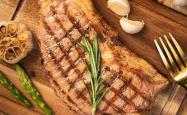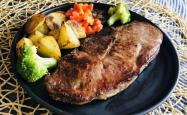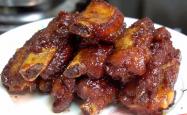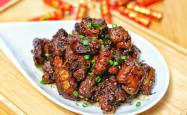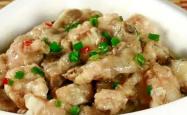How to make Job's tears and winter melon rib soup
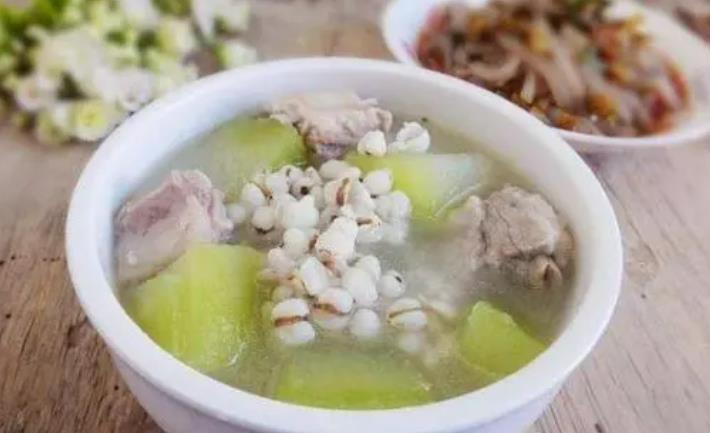
Coix seed and winter melon rib soup is a nutritious and light tasting homely soup, suitable for clearing heat and dampness in summer, and also suitable for a healthy daily diet. The following is the recipe for Job's tears and winter melon rib soup:
The nutritional value of Job's tears and winter melon rib soup
1. Pork ribs: Pork ribs are rich in nutrients such as protein, calcium, phosphorus, and iron. Protein is an important component of human tissue and is crucial for maintaining normal physiological functions of the body. Calcium and phosphorus are essential minerals for bone health, which contribute to the growth and maintenance of bones. Iron is an important component of hemoglobin, which helps to transport oxygen to various parts of the body.
2. Winter melon: Winter melon is a low calorie, high fiber vegetable rich in vitamin C, vitamin B group, minerals, and dietary fiber. It has the effects of clearing heat, diuresis, detoxification, and reducing swelling, helping to promote the discharge of waste in the body and maintain water balance.
3. (Coix seed): Coix seed is a common Chinese medicinal herb, rich in nutrients such as protein, fat, carbohydrates, vitamin B1, vitamin B2, vitamin E, calcium, phosphorus, iron, etc. It has the effects of invigorating the spleen, promoting dampness, clearing heat and detoxifying, helping to regulate the body's moisture and promote metabolism.
Material:
-500g pork ribs
-500g winter melon
-100 grams of Coix seed
-Ginger slices
-1 onion (optional)
-Moderate amount of salt
-Moderate amount of clean water
Method:
1. Prepare pork ribs: Wash and chop the pork ribs into pieces, blanch them in boiling water to remove any blood foam, remove and rinse with clean water. Set aside.
2. Soaking Job's tears: Clean the Job's tears in advance, then soak them in clean water for about 1 hour to make them slightly swollen, making them easier to cook through.
3. Processing winter melon: Peel and seed the winter melon, cut it into large pieces or strips.
4. Boil soup: Add an appropriate amount of water to the pot, add blanched pork ribs, soaked Job's tears, and a few slices of ginger, and bring to a boil over high heat.
5. Stewing: After the water boils, skim off the foam and reduce the heat to continue simmering for about an hour, allowing the soup to fully extract the nutrients and aroma of pork ribs and Job's tears.
6. Adding winter melon: Add the processed winter melon chunks to the soup, boil again, then turn to low heat and continue cooking for 20-30 minutes until the winter melon becomes transparent, indicating that it is fully cooked.
7. Seasoning on the table: Add an appropriate amount of salt according to personal taste for seasoning, sprinkle with scallions to enhance aroma (if necessary), then turn off the heat and serve in a bowl.
Notes:
-When blanching, make sure the water temperature is high enough to completely remove blood and fishy smell.
-Soaking Job's tears is to make it easier to cook. If time is not enough, you can cook Job's tears without soaking them.
-During the stewing process, attention should be paid to the heat. Slow simmering over low heat is beneficial for the clarity of the soup and the flavor of the ingredients.
-It is not advisable to add winter melon too early to avoid overcooking and losing its flavor.
-This soup itself has a light taste, and other ingredients such as red dates and goji berries can be added according to personal preferences to increase nutrition and flavor.
-This soup not only tastes delicious, but also has certain medicinal value. Coix seed has the effects of invigorating the spleen, promoting diuresis, clearing heat, and detoxifying; Winter melon can help relieve heat and diuresis; And pork ribs can supplement
this paper Chinese Recipe Network riginal, reprint and keep the link!Website:https://www.china-recipe.com/post/249.html
1. This website follows industry standards, and any reposted articles will clearly indicate the author and source; 2. For original articles on this website, please indicate the author and source of the article when reprinting. Any behavior that does not respect the original content will be held accountable; 3. The author's submission may be edited, modified or supplemented by us.


